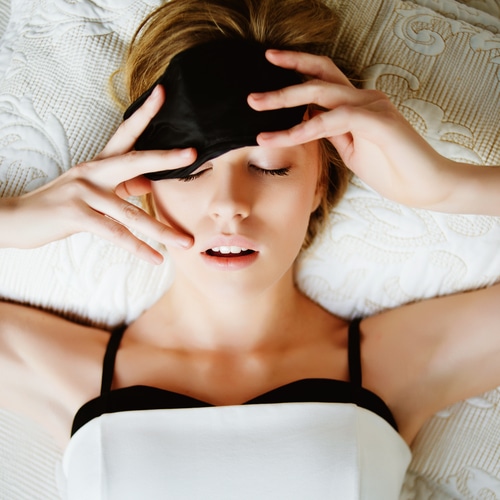
Sleep Apnea Symptoms in Women: Are They Different?
Men are from Mars, women are from Venus. Remember that old book talking about the differences between men and women? While there’s no doubt many things are different between the sexes, you may be surprised by this one: sleep apnea symptoms.
A study published by the UCLA School of Nursing about women with obstructive sleep apnea has found that the symptoms of the sleep-breathing disorder are different in women than in men.
One of the main differences is general health. When you think of a person with obstructive sleep apnea, you may immediately think of an overweight male with serious health issues, such as diabetes and high blood pressure. But the UCLA study found that women with obstructive sleep apnea often appear to be healthy. They usually have normal resting blood pressure and more subtle symptoms. While these can be deemed positives, it does mean that the sleep-breathing condition is missed or misdiagnosed for many women. Unfortunately, this also means they often do not get the treatment they need.
What Is Sleep Apnea?
Sleep apnea is a potentially serious sleep disorder and medical condition in which breathing repeatedly stops and starts during sleep. One of the most common causes of sleep apnea is the muscles of the throat falling back into the airway, blocking the flow of air into the lungs.
When the flow of air is stopped, oxygen does not get into the blood. Without oxygen, your organs and tissues die, and your risk of developing severe illness and potentially life-threatening conditions increases.
How Many People Have Sleep Apnea?
It’s estimated that about 22 million people in the United States have sleep-breathing conditions, but most do not know it.
Men generally are more likely to develop the condition, but women aren’t exempt from risk factors. Women make up nearly 40 percent of patients newly diagnosed with sleep-breathing disorders.
Is Sleep Apnea Serious in Women?
If the symptoms are mild or unnoticeable, is it all that serious for women with sleep apnea? The answer is yes.
The health risks of sleep apnea are serious and can contribute to chronic and severe illnesses, including heart disease, diabetes and even dementia.
Sleep apnea has been shown to affect the heart and heartbeat, which can lead to heart attacks and heart failure.
The study found that while sleep apnea in men is terrible, it is actually worse in women. And it can lead to cardiac health issues, including heart disease, and impact day-to-day living more seriously than it does for men.
This is why early detection and treatment for the condition are critical for sleep apnea patients — it can help protect your brain and other organs from damage when your blood oxygen levels dip.
Identifying Sleep Apnea in Women
As we said, finding out that you have sleep apnea is critical — even more so if you’re a woman because of misdiagnosis or its propensity to be missed.
Many women with OSA do not even snore, one of the most tell-tale signs of sleep-disordered breathing.
Another symptom is difficulty sleeping, but this isn’t an obvious problem for most women or it is chalked up to something else, such as aging or hormones.
This situation leads to an often vicious cycle of seeing doctors and specialists and being told you have a range of conditions ranging from inactive thyroid (hyperthyroidism) or even depression.
What Are the Signs of Sleep Apnea in Women?
- Snoring (not always present, and not necessarily loud or frequent)
- Morning headaches, particularly around the temples
- Memory loss
- Learning difficulties or problems focusing
- Waking up with a dry mouth or sore throat
- Insomnia and difficulty staying asleep
- Moodiness or irritability
Some women also may experience feelings of choking or gasping while they sleep, which may cause them to wake up. In these instances, the affected individual may wake up but not know why they woke up.
Does this sound familiar to you at all? If so, it’s time to give us a call and talk about how you can get a sleep apnea test.
Menopause and Sleep Apnea
Many women after menopause also face an elevated risk of sleep-disordered breathing. Menopause can muddy the waters of diagnosis as its symptoms are similar to sleep apnea. These symptoms include:
- Irregular periods
- Hot flashes
- Trouble sleeping
- Daytime fatigue
- Difficulty concentrating
- Memory loss
- Mood changes
- Vaginal and/or urinary problems (dryness, infections, incontinence)
- Decreased libido
- Joint/muscle pain
- Osteoporosis
- Unexplained weight gain/excess weight
Hormonal conditions including polycystic ovary syndrome can also contribute to the condition. Overweight and obese women are more likely to develop sleep apnea symptoms, but women who are thin also have risk factors.
Treatments for Sleep Apnea
The treatments for obstructive sleep apnea in women vary, just like they do in men, depending on the severity of sleep apnea. The good news is that we can help women living with sleep-disordered breathing, often without resorting to a CPAP machine. Do you want to learn more? Call us now for more information or to schedule a consultation.




